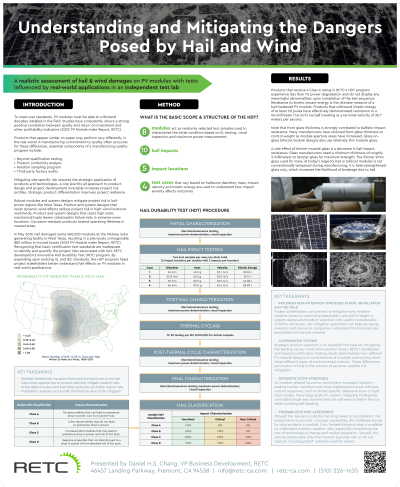Back

Finance & Asset Management
E23 - Understanding and Mitigating the Dangers Posed by Hail and Wind
Tuesday, September 20, 2022
4:30 PM – 5:30 PM
Location: ACC Arena Foyer/Hall A


Daniel Chang
VP Business Development
RETC
Fremont, California, United States
Invited Poster Presenter(s)
An independent technical assessment of the damaging environmental effects on utility scale PV modules from a laboratory’s standpoint
As solar projects increase in frequency, size, geographic distribution and market share, industry stakeholders—especially project sponsors, owners and underwriters—are counting on the long-term reliable operation of solar assets. Power system operators are increasingly counting on renewables for capacity, grid stability and resilience. Businesses and consumers are entirely reliant on power systems that integrate ever-increasing amounts of renewables and solar. The stakes have never been higher.
The future also holds risk and uncertainty, as we have learned from lessons on the ground in places such as Texas. A primary benefit of data-driven project development is that it minimizes risk and uncertainty in favor of long-term reliability, sustainability and profitability.
The direct correlation between the PV module’s ability to produce energy and the financing is an important one to consider when discussing viability of utility scale solar. Every year there are new real-world applications of how damaging extreme weather can be on PV systems deployed out in the field (e.g. Texas, the hail belt).
Direct and actual test findings in the lab using data collected from PV modules submitted for testing by major downstream manufacturers & developers and field provides clear application.
Insurance providers, developers, O&M providers, Module OEMs, system designers
As solar projects increase in frequency, size, geographic distribution and market share, industry stakeholders—especially project sponsors, owners and underwriters—are counting on the long-term reliable operation of solar assets. Power system operators are increasingly counting on renewables for capacity, grid stability and resilience. Businesses and consumers are entirely reliant on power systems that integrate ever-increasing amounts of renewables and solar. The stakes have never been higher.
The future also holds risk and uncertainty, as we have learned from lessons on the ground in places such as Texas. A primary benefit of data-driven project development is that it minimizes risk and uncertainty in favor of long-term reliability, sustainability and profitability.
The direct correlation between the PV module’s ability to produce energy and the financing is an important one to consider when discussing viability of utility scale solar. Every year there are new real-world applications of how damaging extreme weather can be on PV systems deployed out in the field (e.g. Texas, the hail belt).
Direct and actual test findings in the lab using data collected from PV modules submitted for testing by major downstream manufacturers & developers and field provides clear application.
Insurance providers, developers, O&M providers, Module OEMs, system designers
